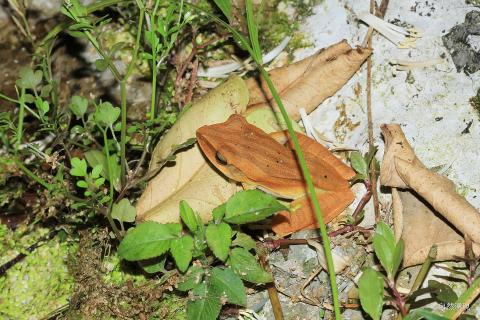The Yilan County Government has urged residents to report sightings of spot-legged tree frogs to its Agriculture Department as part of efforts to protect native tree frog species from the invasive species.
The spot-legged tree frog is native to India and Indochina. During the breeding season, the frog’s eggs attach to aquatic plants and can enter Taiwan via imported plants.
The invasive species was spotted last year in Yilan in a pond and an orchard in Dongshan Township’s (冬山) Linlikeng (淋漓坑) area.

Photo courtesy of Yilan County Government
The species has a strong reproductive ability, eats smaller frogs and competes with other tree frogs that are native to Taiwan for food, water and space.
As a result, the Forestry Bureau has identified the spot-legged tree frog as an invasive species that poses a threat.
Volunteers from Taiwan Amphibian Conservation last year removed the invasive species after it was discovered in the Linlikeng area, but after the breeding season, local groups estimated that more than 100 spot-legged tree frogs had appeared in the area this spring.
The volunteers and the county government this year ramped up their efforts to remove the species.
They captured 26 male and three female spot-legged tree frogs on March 15; 43 male and one female on March 28; and 37 male and three female and two egg masses on April 12.
Although the volunteer group removes spot-legged tree frogs every week, due to a lack of personnel, it is unable to pay attention to every detail, volunteer Lai Yung-hsien (賴擁憲) said.
The invasive species has no natural enemies, he added.
After adapting to Taiwan, it might affect the survival of native species, he said, adding that the group needs more volunteers.
Some of the frogs that were removed have been placed in the “Chaotic World — Invasive Species” exhibition at the Yilan Green Expo, which runs until May 13.
Yang Yi-ju (楊懿如), an associate professor at National Dong Hwa University Department of Natural Resources and Environmental Studies is scheduled to speak about the threat of alien tree frog species at the expo on May 12.

‘DENIAL DEFENSE’: The US would increase its military presence with uncrewed ships, and submarines, while boosting defense in the Indo-Pacific, a Pete Hegseth memo said The US is reorienting its military strategy to focus primarily on deterring a potential Chinese invasion of Taiwan, a memo signed by US Secretary of Defense Pete Hegseth showed. The memo also called on Taiwan to increase its defense spending. The document, known as the “Interim National Defense Strategic Guidance,” was distributed this month and detailed the national defense plans of US President Donald Trump’s administration, an article in the Washington Post said on Saturday. It outlines how the US can prepare for a potential war with China and defend itself from threats in the “near abroad,” including Greenland and the Panama

A wild live dugong was found in Taiwan for the first time in 88 years, after it was accidentally caught by a fisher’s net on Tuesday in Yilan County’s Fenniaolin (粉鳥林). This is the first sighting of the species in Taiwan since 1937, having already been considered “extinct” in the country and considered as “vulnerable” by the International Union for Conservation of Nature. A fisher surnamed Chen (陳) went to Fenniaolin to collect the fish in his netting, but instead caught a 3m long, 500kg dugong. The fisher released the animal back into the wild, not realizing it was an endangered species at

The High Prosecutors’ Office yesterday withdrew an appeal against the acquittal of a former bank manager 22 years after his death, marking Taiwan’s first instance of prosecutors rendering posthumous justice to a wrongfully convicted defendant. Chu Ching-en (諸慶恩) — formerly a manager at the Taipei branch of BNP Paribas — was in 1999 accused by Weng Mao-chung (翁茂鍾), then-president of Chia Her Industrial Co, of forging a request for a fixed deposit of US$10 million by I-Hwa Industrial Co, a subsidiary of Chia Her, which was used as collateral. Chu was ruled not guilty in the first trial, but was found guilty

DEADLOCK: As the commission is unable to forum a quorum to review license renewal applications, the channel operators are not at fault and can air past their license date The National Communications Commission (NCC) yesterday said that the Public Television Service (PTS) and 36 other television and radio broadcasters could continue airing, despite the commission’s inability to meet a quorum to review their license renewal applications. The licenses of PTS and the other channels are set to expire between this month and June. The National Communications Commission Organization Act (國家通訊傳播委員會組織法) stipulates that the commission must meet the mandated quorum of four to hold a valid meeting. The seven-member commission currently has only three commissioners. “We have informed the channel operators of the progress we have made in reviewing their license renewal applications, and